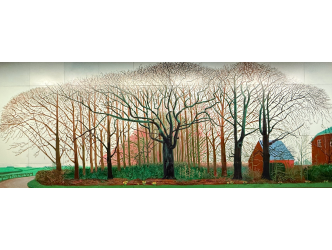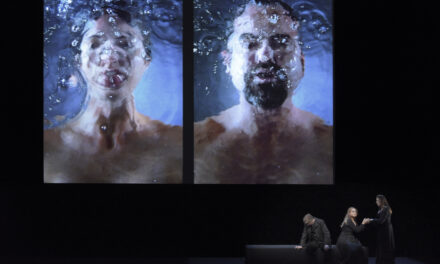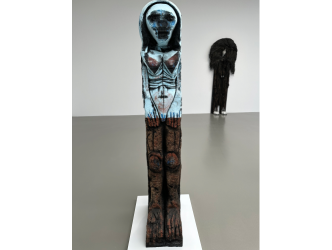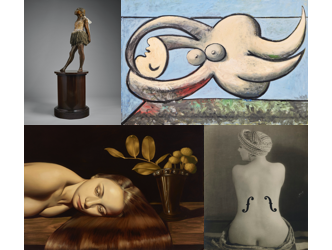In Japan
The Korean artist Lee Ufan (born in 1936), has lived in Japan since he was 20 years old. He has been the subject of various major exhibitions, such as the Guggenheim in New York in 2011 and the park at the Château de Versailles in 2014.
I’ve interviewed him on numerous occasions, including during his exhibition in Aix-en-Provence at the sublime Château La Coste estate (see the report here), his retrospective at the Centre Pompidou Metz (see the report here), and when he created a monumental artwork for the Unlimited section at Art Basel (see the report here).
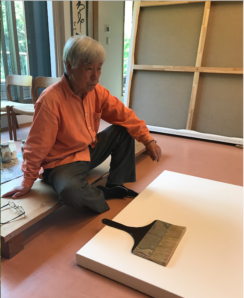
A foundation in Arles
In the summer of 2020 he was due to open his foundation in Arles, a project that has evidently been delayed until the following summer.
Quiet, humble, mystical
He is an artist who is rather quiet, humble and mystical. All of his work, which is abstract, consists of creating a certain tension that addresses subjects like mankind, time, beauty, repetition, the search for harmony, images containing other images…
The right gesture
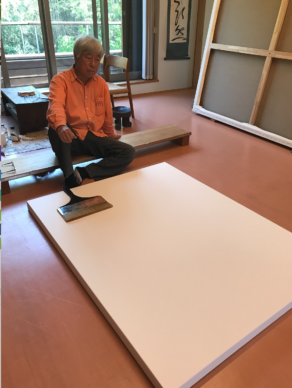
When he was a child in Korea, Lee took lessons in calligraphy. This training has left him with a good sense for the right gesture. Some of his works were made using the broad touch of a large paintbrush on the canvas. He reworks the gesture several times over the same area and the accumulations of paint create gradients, as well as accumulations of material, which resemble landscapes.
In Kamakura
I thought it would be interesting to ask him about his feelings during this period of deep reassessment. For the time being he has retreated to Kamakura, an ancient city an hour away from Tokyo, where he has one of his studios – but no computer. The interview was therefore conducted in writing and translated from the Korean.
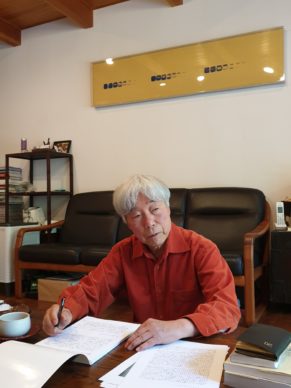
You have retreated to Japan during this crisis. Could you describe where you are and say why you have chosen this place?
I am currently living in Kamakura, a small tourist town with a long history. Given that today’s situation prevents me from working in Europe and in the United States, I am waiting for tomorrow while working in close proximity to my family.
Is it a particularly spiritual place?
The city of Kamakura is situated between the mountains and the sea, and it has many temples and shrines. It is a place where culture and nature coexist in harmony.
In your work you address the tension between things created by man and those from nature. What are your thoughts on the crisis happening today? I believe you are familiar with the idea of the apocalypse. Do you still think about it?
The recent virus is a result of abnormal changes to the environment. It is due to the reckless behaviour of civilization. It is a manifestation of the destruction of nature turning on mankind in the form of a disaster. Humanity is fighting an invisible enemy and trembles in the face of suffering. It is overcome with terror. Many people have already lost their lives and the end is not yet in sight. And yet, surprisingly, the reduction in human activities has given the Earth a renewed vitality: the ozone layer has been significantly repaired, the air has become clearer and the mountains and seas are clean and sparkling. This is the message of hope that the coronavirus is sending us. It is telling us that by slowing down the high-speed rush of civilization we can avoid its collapse, and that communication with Nature is the key to unlocking the future.
How do you spend your days?
I have more free time because all the plans that were in place have now been put on hold. While out walking or looking at the countryside, I see and listen to what I was unable to see or listen to before. In other words, I have a strong sense that I am communicating with the world.
What do you imagine the world of tomorrow to be like?
My opinion of the future is divided. On the one hand I have a positive vision in which a new dimension will be opened up by communication with Nature. But on the other hand I despairingly think that the collapse of civilization is inevitable and humanity will eventually perish. Whatever the future holds, I will continue to work on creating ambivalent artworks that simultaneously address the subject of Nature and civilization.
Do you think this crisis will change people’s behaviour and the behaviour of governments?
I fear that people and politicians will renounce their recent awareness and descend into madness once again. In this context, intellectuals must make efforts to influence them using their words or their art. But artists must above all open themselves up to the outside world instead of positioning themselves as all-powerful, egocentric figures who deal in mass production.
What will be the importance of spirituality? Materialism?
We must not seek spirituality in the ego. Spiritually finds its essence in relationships with the outside world, with others. Materialism is at the source of civilization’s collapse.
As someone who travels a lot, do you think there are certain countries who are more likely to change their mindset?
There is no ideal country that I have visited. In places where there has been less destruction of nature, where culture breathes, you could say the situation is better. But personally I prefer to face contradictions head on. That’s why I go to the civilized cities with numerous problems.
Support independent news on art.
Your contribution : Make a monthly commitment to support JB Reports or a one off contribution as and when you feel like it. Choose the option that suits you best.
Need to cancel a recurring donation? Please go here.
The donation is considered to be a subscription for a fee set by the donor and for a duration also set by the donor.


